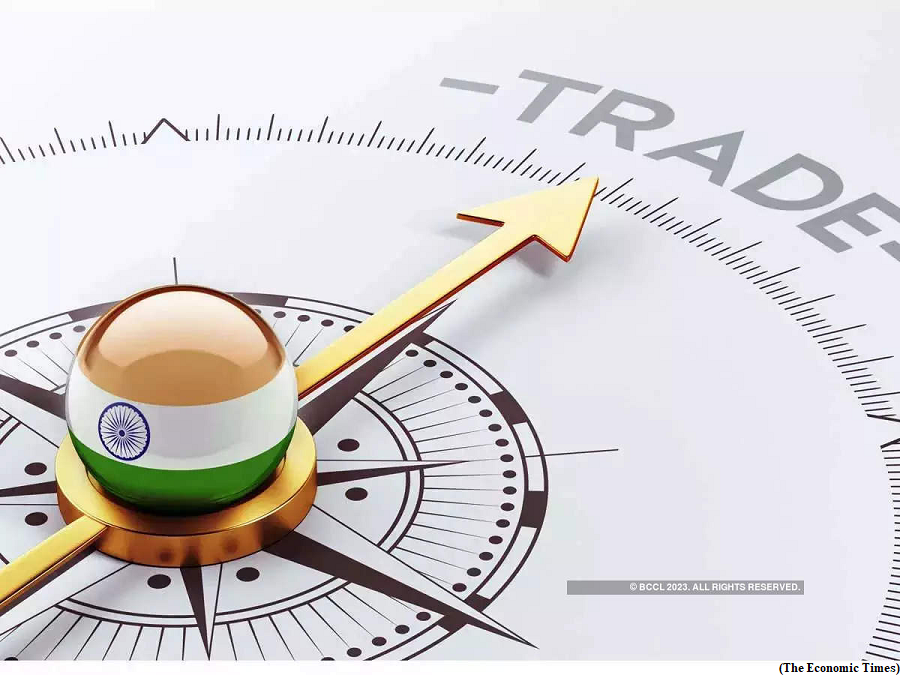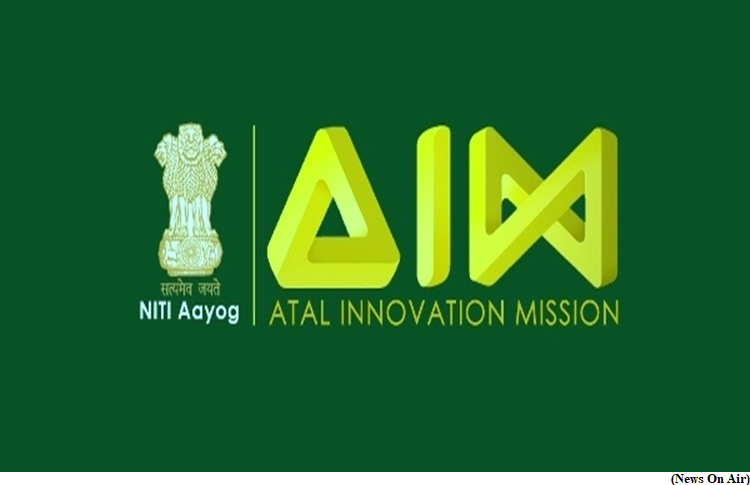Foreign Trade Policy 2023 announced (GS Paper 3, Economy)

Why in news?
- Recently, the Union Minister of Commerce and Industry, launched the Foreign Trade Policy 2023.
- India's overall exports, including services and merchandise exports, has already crossed US$ 750 Billion and is expected to cross US$ 760 Billion in 2023.
Key Approach:
The Key Approach to the policy is based on these 4 pillars:
- Incentive to Remission,
- Export promotion through collaboration - Exporters, States, Districts, Indian Missions,
- Ease of doing business, reduction in transaction cost and e-initiatives and
- Emerging Areas – E-Commerce Developing Districts as Export Hubs and streamlining SCOMET policy.
What is Foreign Trade Policy?
- Foreign Trade Policy (2023) is a policy document which is based on continuity of time-tested schemes facilitating exports as well as a document which is nimble and responsive to the requirements of trade. It is based on principles of ‘trust’ and ‘partnership’ with exporters.
- In the FTP 2015-20, changes were done subsequent to the initial release even without announcement of a new FTP responding dynamically to the emerging situations. Hereafter, the revisions of the FTP shall be done as and when required.
- Incorporating feedback from Trade and Industry would also be continuous to streamline processes and update FTP, from time to time.
FTP 2023:
- The FTP 2023 aims at process re-engineering and automation to facilitate ease of doing business for exporters. It also focuses on emerging areas like dual use high end technology items under SCOMET, facilitating e-commerce export, collaborating with States and Districts for export promotion.
- The new FTP is introducing a one-time Amnesty Scheme for exporters to close the old pending authorizations and start afresh.
- The FTP 2023 encourages recognition of new towns through “Towns of Export Excellence Scheme” and exporters through “Status Holder Scheme”. The FTP 2023 is facilitating exports by streamlining the popular Advance Authorization and EPCG schemes, and enabling merchanting trade from India.
Process Re-Engineering and Automation
- Greater faith is being reposed on exporters through automated IT systems with risk management system for various approvals in the new FTP.
- The policy emphasizes export promotion and development, moving away from an incentive regime to a regime which is facilitating, based on technology interface and principles of collaboration.
- Considering the effectiveness of some of the ongoing schemes like Advance Authorisation, EPCG etc. under FTP 2015-20, they will be continued along with substantial process re-engineering and technology enablement for facilitating the exporters.
- FTP 2023 codifies implementation mechanisms in a paperless, online environment, building on earlier 'ease of doing business' initiatives. Reduction in fee structures and IT-based schemes will make it easier for MSMEs and others to access export benefits.
- Duty exemption schemes for export production will now be implemented through Regional Offices in a rule-based IT system environment, eliminating the need for manual interface.
- During the FY23-24, all processes under the Advance and EPCG Schemes, including issue, re-validation, and EO extension, will be covered in a phased manner.
- Cases identified under risk management framework will be scrutinized manually, while majority of the applicants are expected to be covered under the 'automatic' route initially.
Towns of Export Excellence
- Four new towns, namely Faridabad, Mirzapur, Moradabad, and Varanasi, have been designated as Towns of Export Excellence (TEE) in addition to the existing 39 towns.
- The TEEs will have priority access to export promotion funds under the MAI scheme and will be able to avail Common Service Provider (CSP) benefits for export fulfillment under the EPCG Scheme. This addition is expected to boost the exports of handlooms, handicrafts, and carpets.
Recognition of Exporters
- Exporter firms recognized with ‘status’ based on export performance will now be partners in capacity-building initiatives on a best-endeavor basis.
- Similar to the 'each one teach one' initiative, 2-star and above status holders would be encouraged to provide trade-related training based on a model curriculum to interested individuals. This will help India build a skilled manpower pool capable of servicing a $5 Trillion economy before 2030.
- Status recognition norms have been re-calibrated to enable more exporting firms to achieve 4 and 5-star ratings, leading to better branding opportunities in export markets.
Promoting export from the districts
- The FTP aims at building partnerships with State governments and taking forward the Districts as Export Hubs (DEH) initiative to promote exports at the district level and accelerate the development of grassroots trade ecosystem.
- Efforts to identify export worthy products & services and resolve concerns at the district level will be made through an institutional mechanism – State Export Promotion Committee and District Export Promotion Committee at the State and District level, respectively.
- District specific export action plans to be prepared for each district outlining the district specific strategy to promote export of identified products and services.
Streamlining SCOMET Policy
- India is placing more emphasis on the "export control" regime as its integration with export control regime countries strengthens.
- There is a wider outreach and understanding of SCOMET (Special Chemicals, Organisms, Materials, Equipment and Technologies) among stakeholders, and the policy regime is being made more robust to implement international treaties and agreements entered into by India.
- A robust export control system in India would provide access of dual-use High end goods and technologies to Indian exporters while facilitating exports of controlled items/technologies under SCOMET from India.
Facilitating E-Commerce Exports
- E-commerce exports are a promising category that requires distinct policy interventions from traditional offline trade. Various estimates suggest e-commerce export potential in the range of $200 to $300 billion by 2030.
- FTP 2023 outlines the intent and roadmap for establishing e-commerce hubs and related elements such as payment reconciliation, book-keeping, returns policy, and export entitlements.
- As a starting point, the consignment wise cap on E-Commerce exports through courier has been raised from ₹5Lakh to ₹10 Lakh in the FTP 2023. Depending on the feedback of exporters, this cap will be further revised or eventually removed.
- Integration of Courier and Postal exports with ICEGATE will enable exporters to claim benefits under FTP. The comprehensive e-commerce policy addressing the export/import ecosystem would be elaborated soon, based on the recommendations of the working committee on e-commerce exports and inter-ministerial deliberations.
- Extensive outreach and training activities will be taken up to build capacity of artisans, weavers, garment manufacturers, gems and jewellery designers to onboard them on E-Commerce platforms and facilitate higher exports.
Facilitation under Export Promotion of Capital Goods (EPCG) Scheme
The EPCG Scheme, which allows import of capital goods at zero Customs duty for export production, is being further rationalized. Some key changes being added are:
- Prime Minister Mega Integrated Textile Region and Apparel Parks (PM MITRA) scheme has been added as an additional scheme eligible to claim benefits under CSP (Common Service Provider) Scheme of Export Promotion capital Goods Scheme(EPCG).
- Dairy sector to be exempted from maintaining Average Export Obligation – to support dairy sector to upgrade the technology.
- Battery Electric Vehicles (BEV) of all types, Vertical Farming equipment, Wastewater Treatment and Recycling, Rainwater harvesting system and Rainwater Filters, and Green Hydrogen are added to Green Technology products – will now be eligible for reduced Export Obligation requirement under EPCG Scheme.
Facilitation under Advance authorization Scheme
- Advance authorisation Scheme accessed by DTA units provides duty-free import of raw materials for manufacturing export items and is placed at a similar footing to EOU and SEZ Scheme. However, the DTA unit has the flexibility to work both for domestic as well as export production.
Based on interactions with industry and Export Promotion councils, certain facilitation provisions have been added in the present FTP such as
- Special Advance Authorisation Scheme extended to export of Apparel and Clothing sector under para 4.07 of HBP on self-declaration basis to facilitate prompt execution of export orders – Norms would be fixed within fixed timeframe.
- Benefits of Self-Ratification Scheme for fixation of Input-Output Norms extended to 2 star and above status holders in addition to Authorised Economic Operators at present.
Merchanting trade
- To develop India into a merchanting trade hub, the FTP 2023 has introduced provisions for merchanting trade.
- Merchanting trade of restricted and prohibited items under export policy would now be possible. Merchanting trade involves shipment of goods from one foreign country to another foreign country without touching Indian ports, involving an Indian intermediary.
- This will be subject to compliance with RBI guidelines, andwon’t be applicable for goods/items classified in the CITES and SCOMET list.
- In course of time, this will allow Indian entrepreneurs to convert certain places like GIFT city etc. into major merchanting hubs as seen in places like Dubai, Singapore and Hong Kong.
Amnesty Scheme
- Finally, the government is strongly committed to reducing litigation and fostering trust-based relationships to help alleviate the issues faced by exporters.
- In line with "Vivaad se Vishwaas" initiative, which sought to settle tax disputes amicably, the governmentis introducing a special one-time Amnesty Scheme under the FTP 2023to address default on Export Obligations.
- This scheme is intended to provide relief to exporters who have been unable to meet their obligations under EPCG and Advance Authorizations, and who are burdened by high duty and interest costs associated with pending cases.
- All pending cases of the default in meeting Export Obligation (EO) of authorizations mentioned can be regularized on payment of all customs duties that were exempted in proportion to unfulfilled Export Obligation.
- The interest payable is capped at 100% of these exempted duties under this scheme. However, no interest is payable on the portion of Additional Customs Duty and Special Additional Customs Duty and this is likely to provide relief to exporters as interest burden will come down substantially.
- It is hoped that this amnesty will give these exporters a fresh start and an opportunity to come into compliance.
U.K. to join trans-Pacific partnership trade treaty
(GS Paper 3, Economy)
Why in news?
- Recently, the U.K. acceded to the Comprehensive and Progressive Agreement for Trans-Pacific Partnership (CPTPP), with Prime Minister Rishi Sunak describing the outcome as an example of “post-Brexit freedoms”.
- The agreement will now need to be ratified by Westminster and each of the CPTPP countries.

What it holds for U.K.?
Economic gains:
- The deal would mean that more than 99% of British exports including for key markets such as cheese, cars, chocolate, machinery, gin and whisky would have zero tariffs.
- It includes benefits such as a cut in whisky and car tariffs for British goods going to Malaysia.
- The deal would add £1.8 billion ($2.2 billion) annually to the U.K. economy in the long run. This, however, translates to a modest boost of 0.08% to GDP.
- Once Britain becomes a member of the bloc, U.K. firms will not need to establish a local office or be resident to provide services and will be able to operate on a par with firms in host countries.
Strategic importance:
- The deal was a “gateway” to the Indo-Pacific region which would account for a majority (54%) of global economic growth in the future. The U.K. is currently also negotiating a “free trade” deal with India.
- It will also, as a CPTPP member, get a veto on whether China joins the treaty. China had applied to become a member of the bloc in September 2021. The U.S., in the Donald Trump presidency, had withdrawn from the CPTPP’s precursor, the TPP.
About CPTPP:
- The CPTPP is a Free Trade Agreement (FTA) between 11 countries around the Pacific Rim which are: Canada, Mexico, Peru, Chile, New Zealand, Australia, Brunei, Singapore, Malaysia, Vietnam and Japan.
- After the US withdrew from negotiations of Trans-Pacific Partnership (TPP), the remaining 11 participants scrambled to amend the text of the agreement, and the newly renamed CPTPP was signed in March 2018. It came into force in December 2018.
Atal Innovation Mission Launches Three Innovative Resources
(GS Paper 3, Economy)
Why in news?
- Atal Innovation Mission (AIM), NITI Aayog, has launched three new resources aimed at fostering innovation and creativity among India's youth.
- The launch event introduced the ATL Tinkering Curriculum, Equipment Manual and the Calendar of Activities for 2023-24.

ATL Tinkering Curriculum:
- The ATL Tinkering Curriculum is a structured learning pathway designed to help students develop and hone their innovation skills.
- The curriculum has been developed in collaboration with Makerghat and covers a wide range of concepts, from basic electronics and mechanics to cutting-edge technologies such as 3D printing and Internet of Things.
- With this curriculum, students will be encouraged to identify and design creative solutions to everyday problems through hands-on, experiential learning.
Equipment Manual:
- The Equipment Manual provides comprehensive guidance on the equipment provided in the Atal Tinkering Labs in schools across the country.
- The manual contains detailed information about each equipment and tool, including the specifications, applications, and examples of projects that can be built using them.
- It is a valuable resource for anyone looking to explore the possibilities of innovation and problem-solving.
Calendar of Activities for 2023:
- While as, the Calendar of Activities for 2023-24 outlines a year-long schedule of events, workshops, and competitions aimed at promoting innovation and entrepreneurship among students.
- The calendar has the latest Tinkering Curriculum and Equipment Manual integrated into it.
- It also has a special section called - Activity of the Month which has exciting activities that the students can do in their ATL lab every month.
Way Forward:
- The Atal Innovation Mission is committed to creating a culture of innovation and entrepreneurship among India's youth, and these resources are a testament to that commitment.
- With these resources, teachers, mentors and students across the country will be equipped with the necessary skills to innovate for a better India.




